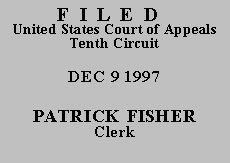

| AL YEAGER,
Plaintiff-Appellant, v. PURINA BENEFIT ASSOCIATION LONG-TERM DISABILITY PLAN, Defendant-Appellee. |
|
Plaintiff brought this action against the long-term disability plan of his former employer, seeking disability benefits. Plaintiff was employed by a subsidiary of Ralston Purina Company, which established the defendant plan to provide long-term disability benefits for its employees. Plaintiff's application for long-term disability benefits was denied because the employer determined plaintiff was not eligible for such benefits under the terms of the plan. Plaintiff brought suit, and the district court granted summary judgment in favor of defendant, finding that plaintiff was not eligible for benefits under the terms of the plan.
We review the district court's grant of summary judgment de novo and apply the same standard as the district court. See Thomas v. Wichita Coca-Cola Bottling Co., 968 F.2d 1022, 1024 (10th Cir. 1992). "Summary judgment is appropriate if 'there is no genuine issue as to any material fact and . . . the moving party is entitled to a judgment as a matter of law.'" Id. (quoting Fed. R. Civ. P. 56(c)). We affirm for the same reasons as set forth in the district court's opinion.
Plaintiff's employment was terminated on May 13, 1994. Several days before that, plaintiff became totally disabled.(1) The benefits provision of the eligibility section of the long-term disability plan provides that benefits will be paid "[u]pon receipt of written proof as required by Section 5.1 demonstrating that a Covered Employee, while covered under this Plan, became Totally Disabled and remained so Totally Disabled during the Qualifying Disability Period." Appellant's App. at 131. The Qualifying Disability Period is defined as "180 consecutive days of continuous Total Disability." Id. at 128. Coverage terminates under the plan when a "Covered Employee ceases to perform work as a regular employee other than a result of a Total Disability . . .." Id. at 130. We agree with the district court that plaintiff was not eligible for benefits under the plan because he did not 1) become totally disabled while he was a Covered Employee; and 2) remain totally disabled while he was a Covered Employee for the qualifying period (180 days).
The judgment of the United States District Court for the Northern District of Oklahoma is AFFIRMED.
Entered for the Court
Circuit Judge
*. This order and judgment is not binding precedent, except under the doctrines of law of the case, res judicata, and collateral estoppel. The court generally disfavors the citation of orders and judgments; nevertheless, an order and judgment may be cited under the terms and conditions of 10th Cir. R. 36.3.
1. Plaintiff claims the date of his disability is May 5, 1994, and defendant submits May 9, 1994. The difference between the two dates is irrelevant for purposes of this appeal.